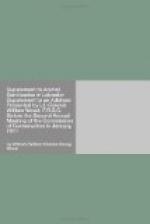No shooting or hunting of any kind is permitted in the Reserve, and in fact members of the public except on special permit are not allowed to carry firearms or to leave certain main tracks.
The species of game mammals found are as follows: Elephant, rhinoceros, hippopotamus, giraffe, buffalo, zebra, sable and roan antelope, kudu, water buck, blue wilde-beest, impalla, reed buck, bush-buck, steenbok, duiker, klipspringer, mountain reed buck, red duiker.
Of game birds there
are: five kinds of francolin, two kinds
of knorhaan, sand grouse,
quail and crested paauw.
The most destructive
of the carnivora are lions, leopards,
chitas, hunting dogs,
caracals and servals.
Baboons, porcupines,
&c., being destructive in various ways,
are considered to be
vermin.
Vermin have perceptibly
decreased during the last few years,
in spite of the fact
that the game has increased at the rate
of fully 10 per cent,
per annum.
About 1,500 head of vermin, on an average, are destroyed annually. The figures for 1910 included 21 lions, 24 leopards, 31 wild dogs, &c., the balance being made up of chetahs, caracals, servals, civets, genets, wild cats, hyenas, jackals, otters, baboons, crocodiles, pythons and birds of prey.
There were 133 prosecutions
for infringement of the
regulations, all against
natives.
Dr. Charles W. Townsend, Boston, Mass., an eminent ornithologist, says:
I have just read with much interest your Address on Animal Sanctuaries in Labrador, and wish to tell you how fully I agree with you, not only as to the importance of stopping the destruction in Labrador before it is too late, but also in the value of animal sanctuaries in general and of Labrador in particular. I sincerely hope you will succeed in your good work.
In the Birds of Labrador, 1907, Boston Society of Natural History, by Mr. Glover, Mr. Allen and myself, we called especial attention to the great destruction of life that has gone on and is still going on there, and we suggested the protection of the eiders for their down, as is done in Norway, instead of their extermination, the present course.
Commander W. Wakeham, of the Department of Marine, says:
No one can question
the desirability of having certain areas
set apart, where wild
animals may find asylum, and rest....
A few years ago, from some unusual cause, the woodland caribou, in great numbers, visited that part of Labrador, east of Forteau, and along down as far as St. Charles. A large number were there killed by the white settlers—but this was a solitary, and exceptional year. The Indians who hunt in the interior of Labrador undoubtedly do kill a large number of these caribou; but, when we consider the great extent of country




